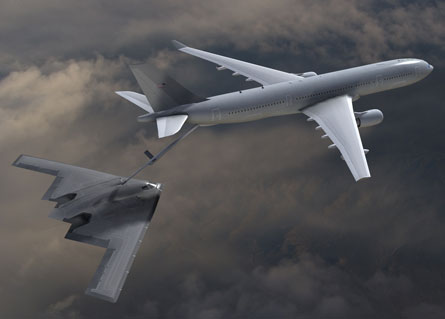The battle for the US Air Force's $35 billion tanker contract may continue despite Northrop Grumman's decision to withdraw, but the contest would involve only a European-based company and not an unlikely bid from Russia.
EADS North America confirmed on 18 March that it would consider submitting a bid after the Department of Defense offered to extend its 10 May deadline to submit responses to a request for proposals for the KC-X contract.
Russia's United Aircraft, however, denied reports that the firm was preparing to submit a bid based on a two-engined version of the Ilyushin Il-96 airliner, which has never been operated as a tanker. John Kirkland, a US lawyer claiming to front the Il-96 proposal, faced accusations that he publicised a hoax.
Meanwhile, EADS NA is discussing a deadline extension with DoD officials.
 |
|---|
© Northrop Grumman |
"We are engaged in active discussions with the company to better understand the reasons why they would need an extension, why they would want an extension," the Pentagon said on 23 March.
"Those conversations are going very well thus far, [but] we have not come to a conclusion and therefore have not made a decision yet about whether to extend the bidding period any further."
For its part, EADS has not decided whether to bid even if the deadline is extended.
Although the Pentagon is discussing the extension, EADS says that its "underlying concerns [are] that the RFP clearly favours a smaller, less-capable aircraft, and that the additional combat capability offered by our system may not be fully valued".
So far, the DoD has not wavered on the terms for the competitive evaluation. To qualify for the contract award, any bidder must meet 372 mandatory requirements, including the ability to offload as much fuel as the Boeing KC-135R does today.
The lowest-priced bidder would win the contract unless the evaluated proposals come within a 1% margin. That threshold would automatically trigger a second evaluation considering up to 94 additional requirements.
Both Northrop and EADS officials have complained since October 2009 that the revised KC-X evaluation process favours an aircraft smaller than its Airbus A330-200-based KC-45. Boeing has proposed a new version of the KC-767 called the NextGen Tanker.
The DoD, however, only tweaked elements of the fixed price contract strategy in response to the complaints. The contracting formula was adjusted so that taxpayers would shoulder more of the financial risk in the event of cost overruns caused by factors other than inflation.
Source: Flight International




















